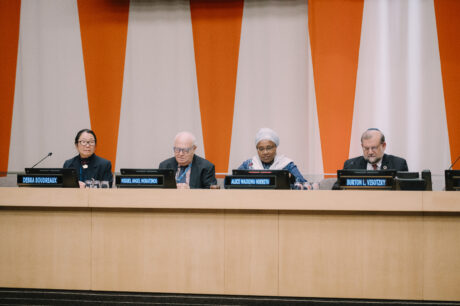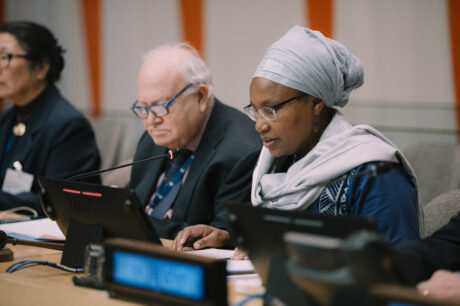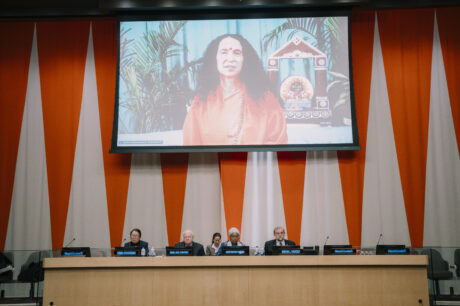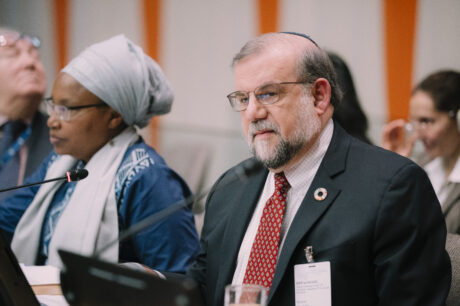New York, 30 November 2023 – The Office of the Special Adviser on the Prevention of Genocide (UNOSAPG) and the United Nations Alliance of Civilizations (UNAOC) hosted a side event with religious leaders and actors at the United Nations headquarters in New York, facilitating a discussion on their role in upholding the values and principles of the 1948 Genocide Convention. The event was held on the margins of the commemoration of the 75th anniversary of the Convention on the Prevention and Punishment of the Crime of Genocide (“Genocide Convention”).
Religious leaders and actors across all faiths are key partners in advancing the principles, values and work of the United Nations. More specific to the prevention of genocide and other atrocity crimes, faith communities have a pivotal role in fostering peaceful, inclusive, and just societies. In this context, since 1948, scores of religious leaders and actors have been tirelessly championing the Genocide Convention, advocating for its ratification, domestication, and implementation.
“The principles that underpin the Genocide Convention are respect for diversity, inclusivity, and non-discrimination. These principles are also integral to the work of religious leaders and actors across the world. In recognizing their pivotal role, we launched the first-ever Plan of Action for Religious Leaders and Actors to Prevent Incitement to Violence that Could Lead to Atrocity Crimes, also known as Fez Plan of Action in 2017 – a Plan of Action which can be seen as the religious leaders’ roadmap to implementing the principles of the Genocide Convention,” said Ms. Alice Wairimu Nderitu, Special Adviser to the UN Secretary-General on the Prevention of Genocide, at the opening of the event. The Special Adviser also underlined the need to reflect deeply on how we can collectively uphold the Convention, joining hands with religious leaders and actors for “Never Again” to be “Never Again”: “we owe it to the victims of the genocide and the future generations.”, she said.
“Seventy-five years ago, the nations of the world united in an unprecedented, at the time, demonstration of resolute and inspired multilateral action to support the first human rights treaty to be adopted by the United Nations — the Genocide Convention,” recalled Mr. Miguel Ángel Moratinos, Under-Secretary-General and High Representative for UNAOC, during his opening remarks. He further highlighted the importance of interreligious and intercultural dialogue in bridging divides, stating, “Let us take inspiration…from religious communities that remind us of our capacity to stand together as one human family — one humanity — rich in cultural and religious diversity, equal in dignity and rights, united in solidarity.”
At its landmark 75th anniversary, the Genocide Convention remains highly relevant, and the role of religious leaders to come together in the face of rising risk factors for genocide and related crimes across the world resonated in the discussion. Distinguished speakers included:
Ms. Sadhvi Bhagawati Saraswati, Secretary-General of the Global Interfaith WASH Alliance reminded that genocide and atrocity crimes are rooted in separation, and the dehumanization of the other, and that all faith leaders must commit to a renewed emphasis on oneness, on the vital and sacred humanity of all.
Dr. Mohamed Elsanousi, Executive Director of The Network for Religious & Traditional Peacemakers noted that we have yet to witness a whole of society approach in supporting prevention work, emphasizing critical role of women and youth, and highlighted that religious leaders and actors have been addressing conflicts within their own communities through indigenous mechanisms for conflict management for hundreds of years, which is something that must be further recognized and integrated.
Rabbi Burton L. Visotzky, Appleman Professor of Midrash and Interreligious Studies Emeritus at the Jewish Theological Seminary noted how religious leaders can use their influence in either positive or negative ways. While some have used their positions to spread messages of hate, others have been responsible for preventing violence and its incitement by spreading messages of love and respect. This is at the core of the Fez Plan of Action for which Rabbi Visotzky urged everyone to support implementation.
Ms. Debra Boudreaux, Chief Executive Officer of the Buddhist Tzu Chi Foundation reiterated commitment to active humanitarian engagement, extending compassion to those facing the harsh reality of violence, displacement, and discrimination and to move forward in unity and compassion against genocide, referring also to the work of the faith-based organizations in implementing the Fez Plan of Action.
Mr. Rudelmar Bueno de Faria, General Secretary at ACT Alliance highlighted that religious leaders and faith communities, guided by principles of justice and compassion, can contribute significantly to exposing the realities of genocide, rejecting the manipulation of facts and advocating for accountability. He also urged the international community to remain vigilant and uncompromising in the implementation of the Genocide Convention.
Codifying for the first time the crime of genocide in international law, the Convention recognizes that “at all periods of history genocide has inflicted great losses on humanity” and that international cooperation is required to “liberate humankind from such an odious scourge”. During the 75 years since its adoption, the Genocide Convention has played an important role, especially in holding perpetrators of this crime accountable and in giving a voice to the victims – a role to which religious leaders and actors have contributed to, and for which they remain invaluable advocates for.
For media queries, please contact:
Julie Ann Ladanan at the United Nations Alliance of Civilizations (julieal@unops.org);
Dalila Sadinlija at Office of the Special Adviser on the Prevention of Genocide (dalila.sadinlija@un.org)




